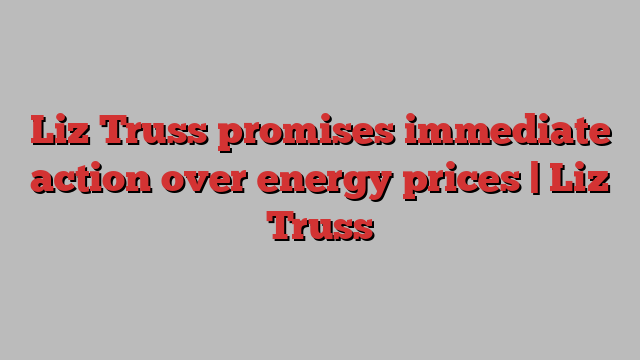
Liz Truss has promised to urgently tackle the energy cost crisis if she becomes prime minister this week, in a final leadership pitch that again emphasised her focus on tax cuts and fewer regulations.
The foreign secretary, who is almost universally predicted to beat Rishi Sunak in the Conservative contest, the result of which is announced on Monday lunchtime, pledged “immediate action” over energy prices for households and businesses, while again not setting out what this might involve.
Writing in the Sunday Telegraph, Truss said a plan would be announced in her first week in office, followed by a formal “fiscal event” later in September. If elected she would formally take over as prime minister from Boris Johnson on Tuesday.
In the longer term on energy supply, Truss said, the UK needed to “take the difficult decisions to ensure we are not in this position every autumn and winter”, adding: “Sticking plasters and kicking the can down the road will not do.”
Truss has, again, not set out what this would involve, but she has expressed support for an increase in nuclear power, new efforts to drill in the North Sea, and the approval of fracking for shale gas. In contrast she is more sceptical about renewable energy, opposing onshore windfarms and solar power schemes on former agricultural land.
Much of the article was devoted to Truss reiterating her pledge to lower taxes and deregulate aspects of the economy, saying Brexit had given the UK “a chance to do things differently”.
“It is a chance to make our country freer, more innovative and more dynamic,” she wrote, promising to get “burdensome EU-inspired law” off UK statute books by the end of 2023.
Truss has, once again, not given details on this. However, on Saturday, the Times said she wanted to remove some EU-based workers’ protections, for example on the length of the working week, and entitlements to holidays.
Truss has made plain her desire to transform the UK in this sort of broad direction, based on lower tax and a smaller role for the state.
“Our economy is not as competitive, dynamic and productive as it could and should be,” she wrote. “It takes too long to get things done: often businesses and families feel like they are wading through treacle. Our tax burden is too high. We need to prioritise reforms to get the economy moving and attract business investment.”
Acknowledging that her efforts to grow the economy “won’t have an immediate impact”, Truss said she would “take decisive action to ensure families and businesses can get through this winter and the next”.
While stressing an approach she said was “underpinned by a firm grip on the public finances”, Truss indicated this would be a more loose approach in the medium term, saying Covid and the invasion of Ukraine “were always going to raise our national debt”.